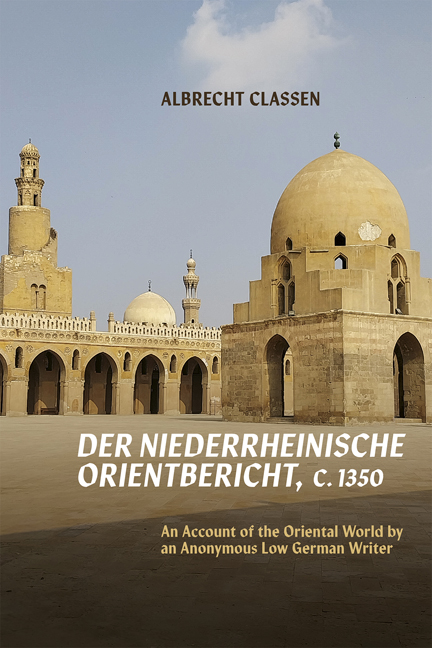 Der Niederrheinische Orientbericht c. 1350
Der Niederrheinische Orientbericht c. 1350 Introduction
Published online by Cambridge University Press: 09 May 2024
Summary
Medieval Travelers and Their Accounts
Recent research has deeply engaged with the vast corpus of medieval and early modern travel and pilgrimage literature, published both in the West and in the East. People in Latinate Europe during the Middle Ages were much on the road, contrary to many modern assumptions, and often covered huge distances. Arabic travelers, however, though also going on huge journeys, such as Ibn Fadlan (879–960), Ibn Jubayr (1145–1217), Ibn Battuta (1304–1368/1369), or Yāqūt Shihāb al-Dīn ibn-ʿAbdullāh al-Rūmī al-Ḥamawī (1179–1229), tended not to approach or touch on Christian European territory, apart from Andalusia (southern Spain) and Sicily (across from Tunisia). There were, of course, also Indian or Chinese travelers, but my knowledge about them is too limited to engage with them here.
Marco Polo (c. 1254–c. 1324), with his Travels (c. 1300), also known as Book of the Marvels of the World, and Il Milione, and in the original Franco-Venetian as Devisement du Monde, composed with the courtly poet Rustichello da Pisa, is of course well-known among medievalists and arguably even to a wider audience to this very day, being recognized as a fascinating and daring author. Children in the USA, for instance, commonly play a game based on the name of Marco Polo. Numerous travel companies use his name for their own purpose, and “Polo” has to serve even for video chat apps.
As famous as Polo's work already was during the late Middle Ages, the “armchair traveler” John Mandeville achieved much wider popularity with his own Travels, although, or perhaps because, fact and fiction intermingle here in a brilliant fashion. As much as Mandeville claimed authority and hence authenticity, he was really more an imaginative writer than an actual traveler. However, his willingness to entertain his audience with much monster lore about the world in the East piqued the general interest, and many other writers followed his pattern long into the early modern age. Mandeville, however, was neither the first literary author to draw on this topic nor the last, as the current translation clearly indicates.
A New Voice From Fourteenth-Century Germany
Previous scholarship has uncovered a wide range of medieval travelogues, editing and analyzing them and often also translating individual narratives. The present volume adds a truly unusual voice to the gamut of available accounts now in English translation.
- Type
- Chapter
- Information
- Der Niederrheinische Orientbericht c. 1350An Account of the Oriental World by an Anonymous Low German Writer, pp. 1 - 14Publisher: Boydell & BrewerPrint publication year: 2024
